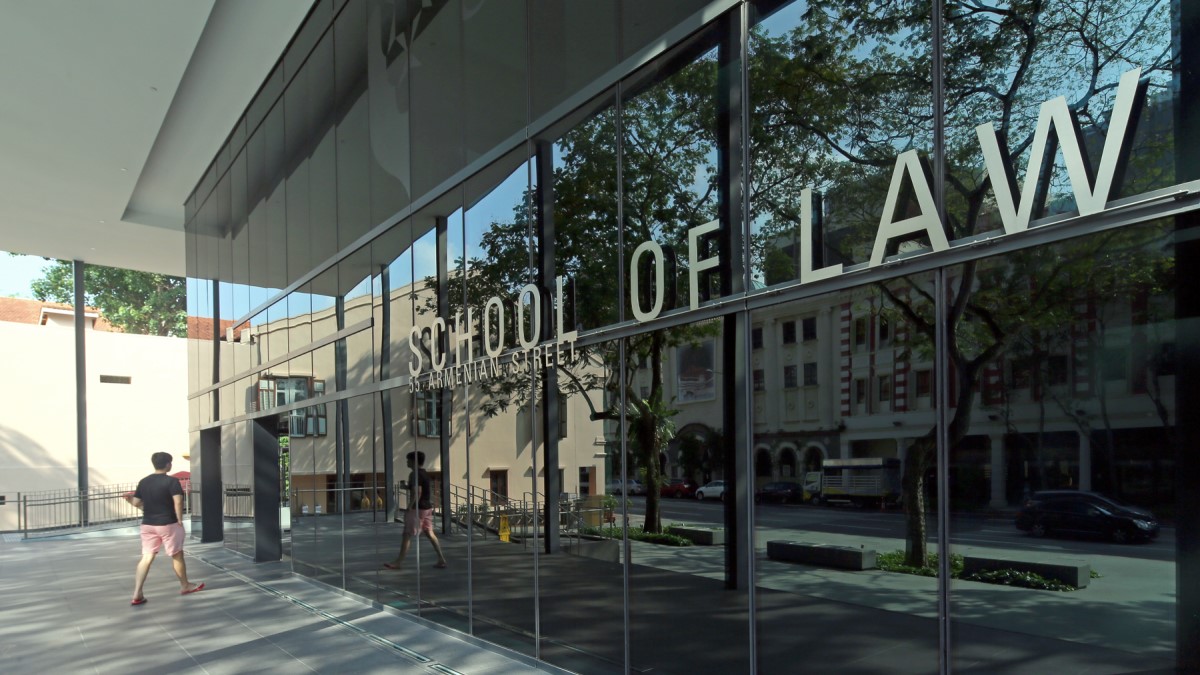
The world in which we work has undergone significant changes, marked by a surge in the adoption of digital tools. Furthermore, the complexities of conducting business have grown in a globalised economy, adding to the challenges that legal professionals must address to stand out in a fast-evolving landscape.
Striving to ensure that students graduate with a future-ready foundation, SMU’s Yong Pung How School of Law (YPHSL) regularly updates its curriculum to ensure it meets new and future challenges.
As part of its most recent review, YPHSL announced enhancements to its Bachelor of Laws (LLB) and Juris Doctor (JD) programmes, in response to input and feedback from a panel of over 50 practising lawyers in the private and public sectors.
These changes include the introduction of specialisation tracks in the practical and interdisciplinary areas of Corporate Transaction, Law and Technology, and Dispute Resolution via a new electives scheme.
“The legal industry is evolving and is demanding in its workforce a higher level of competency in skills and knowledge in adjacent disciplines that are important to the practice and study of law,” says Professor Lee Pey Woan, Dean of SMU YPHSL.
“These changes will further strengthen and distinguish SMU’s LLB programme, and nurture future-ready and practice-ready SMU law graduates; they also give students a distinct competitive edge when they enter the workforce.”
Giving students the flexibility to tailor their curriculum in a relevant way
Recently launched, the Tracks scheme aims to guide students in selective electives that are relevant to key and emerging practice areas, allowing them the flexibility to tailor their curriculum in accordance with their preferred field.
“This scheme is more than a simple curation of law electives within a law subfield,” explains Professor Lee.
“It builds upon the multi and interdisciplinary nature of our existing LLB curriculum in recognition that the law does not exist in the abstract, but to serve business and broader societal needs. It also recognises the growing diversity in legal career options and the inevitable shift towards more complex work.”
By pursuing specialised pathways of study that align with their areas of interest and expertise, students can acquire in-depth knowledge, specialised skills, and a deeper understanding of the industry. This approach not only showcases their passion and dedication but also equips students with a unique set of skills that sets them apart from other candidates.
As one prospective employer, Charles Lim Sing Siong, General Counsel & Managing Director Legal and Compliance Department, GIC, notes: “SMU’s progressive decision to offer inter-disciplinary specialist tracks nurture well-rounded lawyers who have deep specialist knowledge and strong industry engagement, complemented by diverse legal expertise acquired through a broad and rigorous multi-disciplinary curriculum.”
Currently, all law graduates at SMU receive baseline exposure to adjacent disciplines such as finance and technology as part of the SMU LLB curriculum. With the introduction of the Tracks scheme, students enrolled on and after Academic Year 2021-2022 who are keen to delve deeper into any of these interdisciplinary areas can choose to declare a track, and this will be reflected in all official transcripts.
SMU YPHSL is currently the only law school in Singapore that currently offers specialisations in law, and this enhancement scheme stands testament to the University’s innovative approach to education. Such flexibility is crucial in an evolving legal sector, which demand a lifelong commitment to innovation and change.
Adding polish with the Law Capstone course
In addition, all LLB and JD students are required to complete a Law Capstone Course before they graduate. The requirement provides students with an opportunity to apply their legal knowledge and skills in a real-world context and is designed to challenge students to integrate and synthesise their learnings and apply it to a specific problem or project.
“Recognising that real world problems are increasingly complex, the Law Capstone course adds the polishing touch, training students to look across traditional boundaries by working on projects that span three or more areas of the law and through a practical lens,” shares Professor Lee.
“Rather than looking for fixed or standard answers, students participate in the process of creating new solutions.”
This move builds upon SMU’s flagship SMU-X – a project-based experiential learning programme where SMU students work in small groups and apply their interdisciplinary knowledge on real-world projects with industry and faculty mentors. Every Law Capstone course will be an SMU-X course, and students have to take on a Law Capstone designation when they declare a specialisation track.
The recent enhancements to the law curriculum represent a step towards equipping law graduates with the necessary skills to navigate the ever-changing legal landscape. With the increasing pace of technological advancement, regulatory changes, and globalisation, legal professionals need to stay up to date with the latest developments.
By focusing on niche areas of study, SMU aims to arm its law graduates with that extra edge to stay prepared and relevant in a world under constant flux — thereby positioning itself as a leader in innovative legal education.
As Mr Lim adds: “This enables our lawyers to thrive in a fast-changing world with complex and difficult challenges to resolve.”


